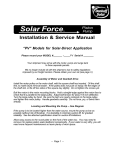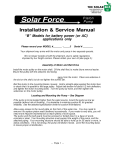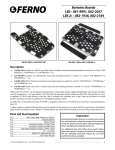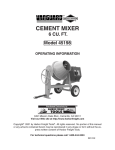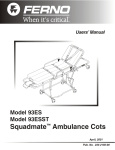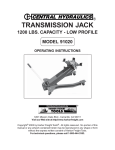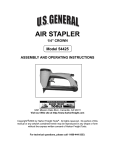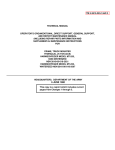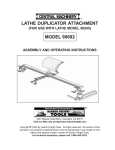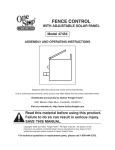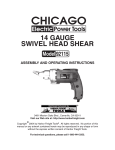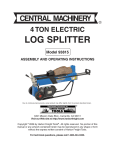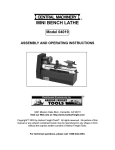Download Harbor Freight Tools 90178 User's Manual
Transcript
CEMENT MIXER - 3.5 CUBIC FOOT
®
WITH BRIGGS & STRATTON 3.5 HP ENGINE
Model 90178
ASSEMBLY AND OPERATING INSTRUCTIONS
®
3491 Mission Oaks Blvd., Camarillo, CA 93011
Visit our Web site at http://www.harborfreight.com
Copyright 2003 by Harbor Freight Tools®. All rights reserved. No portion of this
manual or any artwork contained herein may be reproduced in any shape or form
without the express written consent of Harbor Freight Tools.
For technical questions, please call 1-800-444-3353.
PRODUCT SPECIFICATIONS
"
;<!%
%
;
<
!
#$
%&' ®
()!*+-+"
/--5$(
"
)6---:
=> +
?;
)=
<:
%@"
'!:!!'!%
$)%
SAVE THIS MANUAL
You will need this manual for the safety warnings and precautions, assembly,
operating, inspection, maintenance and cleaning procedures, parts list and
assembly diagram. Keep your invoice with this manual. Write the invoice
number on the inside of the front cover. Keep this manual and invoice in a safe
and dry place for future reference.
GENERAL SAFETY WARNINGS AND PRECAUTIONS
1.
Keep work area clean and dry. Cluttered, damp, or wet work areas invite
injuries.
2.
Keep children away from work area. Do not allow children to handle or climb
on or in this product.
3.
Store idle equipment. When not in use, tools and equipment should be stored
in a dry location to inhibit rust. Always lock up tools and equipment, and keep out
of reach of children.
4.
Do not use this product if under the influence of alcohol or drugs. Read
warning labels on prescriptions to determine if your judgement or reflexes are
impaired while taking drugs. If there is any doubt, do not attempt to use this
product.
5.
Dress safely. Do not wear loose clothing or jewelry, as they can become caught
in moving parts. Wear a protective hair covering to prevent long hair from becoming caught in moving parts. If wearing a long-sleeve shirt, roll sleeves up
above elbows.
SKU 90178
PAGE 2
6.
Do not overreach. Keep proper footing and balance at all times to prevent
tripping, falling, back injury, etcetera.
7.
Industrial applications must follow OSHA requirements.
8.
Stay alert. Watch what you are doing at all times. Use common sense. Do not
use this product when you are tired or distracted from the job at hand.
9.
Check for damaged parts. Before using this product, carefully check that it will
operate properly and perform its intended function. Check for damaged parts
and any other conditions that may affect the operation of this product. Replace
or repair damaged or worn parts immediately.
10.
Replacement parts and accessories: When servicing, use only
identical replacement parts. Only use accessories intended for use with this
product. Approved accessories are available from Harbor Freight Tools.
11.
Maintain this product with care. Keep this product clean and dry for better and
safer performance.
12.
Maintenance: For your safety, service and maintenance should be performed
regularly by a qualified technician.
13.
Use the right tool for the job. Do not attempt to force a small tool or attachment to do the work of a larger industrial tool. There are certain applications for
which this tool was designed. It will do the job better and more safely at the rate
for which it was intended. Do not modify this tool, and do not use this tool for a
purpose for which it was not intended.
14.
WARNING! The warnings, precautions, and instructions discussed in this manual
cannot cover all possible conditions and situations that may occur. The operator
must understand that common sense and caution are factors, which cannot be
built into this product, but must be supplied by the operator.
SPECIFIC PRODUCT WARNINGS AND PRECAUTIONS
1.
Maintain a safe working environment. Keep the work area well lit. Make sure
there is adequate surrounding workspace. Always keep the work area free of
obstructions, grease, oil, trash, and other debris. Do not use the Cement Mixer
in areas near flammable chemicals, dusts, and vapors.
2.
Always place the Cement Mixer on a solid, flat, level, surface that is capable of supporting the weight of the Mixer and its load.
SKU 90178
PAGE 3
3.
Keep a safe clearance around the Cement Mixer. Keep all people (except the
operator) a minimum of six feet from the Mixer during operation.
4.
Keep all guards in place and in proper working condition.
5.
Remove adjusting tools, shovels, hand trowels, etc. Make sure all adjusting
tools, shovels, hand trowels, and other tools and equipment are removed from
the Cement Mixer prior to turning it on.
6.
Never stick your hands and/or tools into the Drum Assembly (parts #44,
#47) while the Cement Mixer is in operation.
7.
Do not overload the Cement Mixer. An overload may damage the equipment.
8.
Do not move the Cement Mixer during operation. The Mixer could tip over or
the Engine could be damaged.
9.
Use eye and hand protection. Wear ANSI approved safety impact eye goggles
and heavy-duty work gloves when using the Cement Mixer. ANSI approved
safety impact eye goggles and heavy-duty work gloves are available from Harbor
Freight Tools.
10.
Prolonged exposure to noise levels above 85 dBA is hazardous to hearing.
Always wear ANSI approved hearing protection when operating or working near
the Cement Mixer while it is running. ANSI approved hearing protectors are
available from Harbor Freight Tools.
11.
Prior to using the Cement Mixer, make sure you read and completely understand this instruction manual and the gasoline Engine manufacturer’s
instruction manual.
12.
Make sure to fill the gasoline Engine (part #14) with a premium quality, 30weight, non-detergent, engine oil before each use. Running the Engine with
no oil or low oil will cause damage to the Engine and void the warranty.
13.
When checking the Engine’s (part #14) oil level, make sure to unscrew (do
not pull) the Dip Stick out.
14.
Gasoline fuel and fumes are flammable, and potentially explosive. Use
proper fuel storage and handling procedures. Always have multiple ABC class
fire extinguishers nearby.
15.
Keep the Cement Mixer and surrounding area clean at all times.
16.
When spills of fuel or oil occur, they must be cleaned up immediately.
SKU 90178
PAGE 4
Dispose of fluids and cleaning materials in accordance with all local, state, or
federal codes and regulations. Store oil rags in a covered metal container.
17.
Never store fuel or other flammable materials near the Cement Mixer.
18.
Do not smoke, or allow sparks, flames, or other sources of ignition around
the Engine (part #14) and its fuel tank. Fuel vapors are explosive.
19.
Keep grounded conductive objects, such as tools, away from exposed, live
electrical parts and connections to avoid sparking or arcing. These events
could ignite fumes or vapors.
20.
Do not refill the fuel tank while the Engine (part #14) is running.
21.
Do not operate the Cement Mixer with known leaks in the fuel system.
22.
Avoid body contact with fuels, oils, and lubricants used for the Cement
Mixer. Avoid contact with hot fuel, oil, exhaust fumes, and solid surfaces.
23.
Excessive buildup of unburned fuel gases in the exhaust system can create
a potentially explosive condition. This buildup can occur after repeated failed
start attempts, valve testing, or hot Engine (part #14) shutdown. If this occurs,
open the exhaust system drain plugs, if equipped, and allow the gases to dissipate before attempting to restart the Engine.
24.
WARNING! Carbon monoxide exhaust from the Engine (part #14) can
cause severe nausea, fainting, or death. Do not operate the Cement Mixer
inside a closed building or a poorly ventilated area. Carbon monoxide is a
colorless odorless gas that can cause death.
25.
Use only Engine (part #14) manufacturer recommended fuel and oil.
26.
Always turn off the Engine (part #14). Allow the Engine to completely cool,
and disconnect the Engine’s spark plug cable from the spark plug before performing any inspection, maintenance, or cleaning on the Cement Mixer.
WARNING! This product contains or produces a chemical known to the State of
California to cause cancer and birth defects (or other reproductive harm).
(California Health & Safety Code 25249.5 et seq.)
27.
28.
WARNING! People with pacemakers should consult with their physician(s)
before using this product. Operation of equipment in close proximity to a heart
pacemaker could cause interference or failure of the pacemaker.
SKU 90178
PAGE 5
UNPACKING
When unpacking, check to make sure all the parts shown on the Parts List on page 18
are included. If any parts are missing or broken, please call Harbor Freight Tools at the
number shown on the cover of this manual as soon as possible.
ASSEMBLY INSTRUCTIONS
NOTE: For additional references to the parts listed in the following pages, refer to the
Assembly Diagram on page 19. Assemble the Cement Mixer in a clean work area with
a flat, level floor surface that is capable of supporting the weight of this product, and all
required assembly tools (not included).
1.
With assistance, insert the Stand (part #1) into the Hinge Bracket (part #2) and
Support Bracket (part #6). Align the four mounting holes of the Stand with the
two mounting holes in the Hinge Bracket and two mounting holes in the Support
Bracket. Secure the Stand to the Hinge Bracket and Support Bracket, using four
Hex Bolts (part #7), four Flat Washers (part #10), four Spring Washers (part #9),
and four Nuts (part #8). (See Figure A.)
HEX BOLT (#7)
FLAT WASHER (#10)
SPRING WASHER (#9)
NUT (#8)
HEX BOLT (#7)
FLAT WASHER (#10)
SPRING WASHER (#9)
NUT (#8)
FIGURE A
2.
Slide one Wheel (part #5) onto one end of the Hinge Bracket (part #2) axle.
Insert one Flat Washer (part #3) onto the end of the Hinge Bracket and against
the Wheel. Insert one Pin (part #4) through the holes located at the end of the
Hinge Bracket axle. Then, spread both tongs of the Pin apart to secure the
Wheel in place. Repeat this step for the remaining Wheel.
(See Figure B, next page.)
3.
With assistance, set the Lower Drum (part #44) with its pre-attached Support Arm
(part #31) into the Stand (part #1) assembly. Align the two mounting holes in the
Support Arm with the two mounting holes in the Stand assembly. Then secure
the Lower Drum to the Stand assembly, using two Hex Bolts (part #7), two Flat
SKU 90178
PAGE 6
WHEEL (#5)
FLAT WASHER (#3)
PIN (#4)
FIGURE B
Washers (part #10), two Spring Washers (part #9), and two Nuts (part #8).
(See Figure C.)
LOWER DRUM (#44)
HEX BOLT (#7)
FLAT WASHER (#10)
SPRING WASHER (#9)
NUT (#8)
HEX BOLT (#7)
FLAT WASHER (#10)
SPRING WASHER (#9)
NUT (#8)
SUPPORT ARM (#31)
FIGURE C
4.
Align the two mounting holes in the Degree Adjusting Plate (part #37) with the
two mounting holes located on the upper right side of the Support Arm (part #31).
Then attach the Degree Adjusting Plate to the Support Arm, using two Hex Head
Bolts (part #27), two Flat Washers (part #10), two Spring Washers (part #9), and
two Nuts (part #8). (See Figure C, and Figure D, next page,)
5.
Insert the Spring (part #39) into the lower portion of the Degree Adjusting Arm
(part #38). Then, insert the Degree Adjusting Arm onto the Pivot Shaft of the
Degree Adjusting Plate (part #37). See Figure D.)
SKU 90178
PAGE 7
HEX HEAD BOLT (#27)
FLAT WASHER (#10) NOT SHOWN
SPRING WASHER (#9) NOT SHOWN
NUT (#8) NOT SHOWN
DEGREE
ADJUSTING
PLATE
(#37)
DEGREE
ADJUSTING
ARM
(#38)
SPRING
(#39)
BOLT
(#40)
PIVOT ARM
OF
DEGREE
ADJUSTING PLATE
(#37)
NUT
(#8)
DEGREE
ADJUSTING
ARM
(#38)
DEGREE
ADJUSTING
PLATE
(#37)
SUPPORT
ARM
(#31)
FIGURE D
6.
Secure the Degree Adjusting Arm (part #38) to the Pivot Shaft of the Degree
Adjusting Plate (part #37), using one Bolt (part #40) and one Nut (part #8).
(See Figure D.)
SKU 90178
PAGE 8
7.
Align the six mounting holes of the Connector Seal (part #45) with the six mounting holes in the Upper Drum (part #47). Then, glue (not included) the Connector
Seal to the Upper Drum. NOTE: Make sure the Connector Seal lays flat on the
Upper Drum to ensure a proper seal. (See Figure E.)
MOUNTING
HOLE
UPPER
DRUM
(#47)
CONNECTOR
SEAL
(#45)
FIGURE E
8.
Place the Upper Drum (part #47) on the Lower Drum (part #44), making sure the
six mounting holes are aligned in both. Insert six Bolts (part #48) downward
through each mounting hole. Then secure the Upper Drum to the Lower Drum
with six Flat Washers (part #10), six Spring Washers (part #9), and six Nuts
(part #50). (See Figure F.)
UPPER DRUM (#47)
BOLT (#48)
FLAT WASHER (#10)
SPRING WASHER (#9)
NUT (#50)
LOWER DRUM (#44)
FIGURE F
9.
Mount the two Mixing Blades (part #46) inside the Drum (parts #44, #47) assembly with their V-shaped bends pointing to the left. Use four Bolts (part #49, four
SKU 90178
PAGE 9
Flat Washers (part #10), four Spring Washers (part #9), and four Nuts (part #50)
to secure the two Mixing Blades to the inside Drum assembly. (See Figure G.)
DRUM ASSEMBLY
(#44, #47)
MIXING
BLADE
(#46)
MOUNT WITH
V-SHAPED BENDS
POINTING TO LEFT.
FIGURE G
10.
Locate the Iron Tube Fixture (part #30) and Shaft (part #35) on the left side of the
Cement Mixer. (See Figure H.)
IRON TUBE
FIXTURE
(#30)
SHAFT
(#35)
FIGURE H
11.
Insert the Fixing Plate (part #18) onto the Shaft (part #35).
(See Figure I, next page.)
12.
Insert the Inner Cover (part #23) onto the Shaft (part #35).
(See Figure J, next page.)
13.
Align the mounting holes in the Inner Cover (part #23), Fixing Plate (part #18),
and Iron Tube Fixture (part #30). Then secure the Inner Cover and Fixing Plate
to the Iron Tube Fixture, using the hardware shown in Figure K.
(See Figure H & K)
SKU 90178
PAGE 10
FIXING PLATE
(#18)
SHAFT
(#35)
FIGURE I
SHAFT
(#35)
MOUNTING SLOTS
INNER COVER
(#23)
FIGURE J
14.
Align the four mounting holes in the Engine Mount Plate (part #12) with the two
mounting slots located in the lower portion of the Inner Cover (part #23). Position
the Small Fixing Plate (part #51) against the vertical arm of the Stand (part #1).
Insert four Bolts (part #13) through the mounting holes, mounting slots, and
mounting holes in the Small Fixing Plate. Then, secure the Bolts with four Flat
Washers (part #10), four Spring Washers (part #9), and four Nuts (part #8).
(See Figure J, and Figure L, next page.)
SKU 90178
PAGE 11
BOLT (#48)
FLAT WASHER (#19)
SPRING WASHER (#20)
NUT (#50)
BOLT (#48)
FLAT WASHER (#19)
SPRING WASHER (#20)
NUT (#50)
HEX HEAD BOLT (#27)
FLAT WASHER (#19)
SPRING WASHER (#20)
NUT (#21)
HEX HEAD BOLT (#27)
FLAT WASHER (#19)
SPRING WASHER (#20)
NUT (#21)
BOLT (#48)
FLAT WASHER (#19)
SPRING WASHER (#20)
NUT (#50)
BOLT (#48)
FLAT WASHER (#19)
SPRING WASHER (#20)
NUT (#50)
FIGURE K
INNER COVER
(#23)
BOLT (#13)
INNER COVER (#23)
FIXING PLATE (#18)
FLAT WASHER (#10)
SPRING WASHER (#9)
NUT (#8)
SMALL
FIXING
PLATE
(#51)
ENGINE
MOUNT
PLATE
(#12)
BOLT (#11)
FLAT WASHER (#10)
SPRING WASHER (#9)
NUT (#8)
LEFT SIDE VIEW
FRONT VIEW
FIGURE L
15.
Align the mounting hole in the Angle Brace of the Engine Mount Plate (part #12)
with the mounting hole in the Hinge Bracket (part #2). Then, secure the Angle
Brace to the Hinge Bracket with one Bolt (part #11), one Flat Washer (part #10),
one Spring Washer (part #9), and one Nut (part #8).
(See Figure L.)
SKU 90178
PAGE 12
16.
Unscrew the Thrust Screw (part #17) located in the Large Pulley (part #26). Align
the Keyway Slot of the Large Pulley with the Key on the Shaft (part #35). Using
a hammer, carefully tap the Large Pulley onto the Shaft. Retighten the Thrust
Screw to secure the Large Pulley in place. (See Figure M.)
FIGURE M
17.
LARGE PULLEY (#26)
SHAFT (#35)
Loop the V-Belt (part #22) around the Large Pulley (part #26). Set the gasoline
Engine (part #14) on the Engine Mount Plate (part #12) with its Small Pulley
(part #16) facing the Inner Cover (part # 23). Then, loop the V-Belt around the
Small Pulley. (See Figure N.)
LARGE PULLEY (#26)
INNER COVER (#23)
V-BELT (#22)
SMALL PULLEY (#16)
GASOLINE
ENGINE
(#14)
ENGINE MOUNT
PLATE
(#12)
FIGURE N
SKU 90178
PAGE 13
18.
Align the four mounting holes in the base of the Engine (part #14) with the four
mounting slots in the Engine Mount Plate (#12). Insert four Hex Bolts (part #7)
downward through the mounting holes and mounting slots. Insert one Flat
Washer (part #10) and one Spring Washer (part #9) on each of the four Bolts.
Then, finger tighten only one Nut (part #8) onto each of the four Bolts.
(See Figure O.)
19.
Use a straight edge (chisel, ruler, etc.) to make sure the Large Pulley (part #26)
and Small Pulley (part # 16) are aligned parallel to one another. If necessary,
move the Engine (part #14) forward or backward along the Engine Mount Plate
(part #12). Once aligned, secure the Engine in place by tightening the four Nuts
(part #8). (See Figure O.)
ENGINE
MOUNT
PLATE
(#12)
ALIGN
LARGE PULLEY (#26)
AND
SMALL PULLEY (#16)
HEX BOLT (#7)
FLAT WASHER (#10)
SPRING WASHER (#9)
NUT (#8)
FIGURE O
20.
Align the seven mounting holes in the Engine Cover (part #25) with the seven
mounting holes in the Inner Cover (part #23). Then secure the Engine Cover to
the Inner Cover, using seven Bolts (part #24), seven Flat Washers (part #10),
seven Spring Washers (part #9), and seven Nuts (part #8).
(See Figure P, next page.)
SKU 90178
PAGE 14
INNER
COVER
(#23)
BOLT (#24)
FLAT WASHER (#10)
SPRING WASHER (#9)
NUT (#8)
ENGINE
COVER
(#25)
FIGURE P
OPERATING INSTRUCTIONS
1.
IMPORTANT: ALWAYS make sure the crankcase of the gasoline Engine
(part #14) is filled to the proper level with a premium quality, 30-weight,
non-detergent engine oil prior to starting the engine. Failure to do so will
result in damage to the Engine and void its warranty. Refer to the Engine
manufacturer’s instruction manual for further information.
CAUTION: NEVER REFILL THE ENGINE’S FUEL TANK WHILE THE ENGINE
(PART #14) IS RUNNING.
2.
CAUTION! Do not attempt to move the Cement Mixer when it is full and/or in
operation.
3.
Place the Cement Mixer on a solid, flat, level surface that is capable of supporting the weight of the Mixer and its load.
4.
Start the Engine (part #14), and allow it to reach the appropriate operating speed
and temperature as instructed in the Engine manufacturer’s operating manual.
5.
NOTE: Filling and emptying the Drum (parts #44, #47) is best done with the
Drum rotating. Do not turn off the Cement Mixer while full of cement.
6.
With the Drum (parts #44, #47) operating between 20-36 RPM, the Cement
Mixer is now ready for the addition of the cement mix.
7.
To determine the proper amount of water, gravel, cement, and sand, refer to
Figure Q, next page.)
SKU 90178
PAGE 15
!"
#
"!"
$
FIGURE Q
8.
For best results, proceed as follows:
A. Pour the required amount of water into the Drum (parts #44, #47).
B. Add the required amount of gravel into the Drum.
C. Add the required amount of cement into the Drum.
D. Add the required amount of sand into the Drum.
9.
Allow adequate time for the water, gravel, cement, and sand to thoroughly mix.
10.
To discharge the cement mix, pull out on the Degree Adjusting Arm (part #38)
and, firmly with both hands, pull down on the Degree Adjusting Arm until the desired angle is achieved and the cement mix begins pouring out of the Drum
(parts #44, #47). (See Figure R)
DRUM
(#44, #47)
DEGREE
ADJUSTING ARM
(#38)
ENGINE
(#14)
FIGURE R
SKU 90178
PAGE 16
11.
After discharging the cement mix, raise the Degree Adjusting Arm (part #38) up
to its original position. (See Figure Q.)
12.
Repeat Steps #5 through #11 if more cement mix is required.
13.
When finished, make sure to thoroughly clean the inside of the Drum
(parts #44, #47). (See “Inspection, Maintenance, And Cleaning” Section.)
INSPECTION, MAINTENANCE, AND CLEANING
1.
WARNING! Never perform any inspection, maintenance, or cleaning procedures
on the Cement Mixer while it is running. Before performing any services, turn off
the Engine (part #14) and disconnect its spark plug wire to prevent accidental
starting.
2.
Before each use, inspect the general condition of the Cement Mixer. Check for
loose screws, misalignment or binding of moving parts, cracked or broken parts,
damaged, and any other condition that may affect the safe operation of this tool.
If abnormal noise or vibration occurs, immediately turn off the Engine
(part #14), disconnect the Engine’s spark plug wire, and have the problem corrected before further use. Do not use damaged equipment.
3.
Thoroughly clean the Cement Mixer at the end of each day’s operation. The
Drum (parts #44, #47) may be scoured for approximately two minutes, using a
gravel and water mixture. Then, discharge the gravel/water mixture and hose
down the Drum inside and out.
4.
Dried cement should be scraped out of the Drum (parts #44, #47). Do not beat
on the Drum with a shovel or other tools to break up accumulations of dried
cement mix, as damage to the Cement Mixer may result.
5.
Do not pour or spray water on the gasoline Engine (part #14).
6.
Daily check the oil level in the gasoline Engine (part #14). Refer to the Engine
manufacturer’s operation manual for the type and level of oil recommended, and
all other Engine service and maintenance instructions.
SKU 90178
PAGE 17
PLEASE READ THE FOLLOWING CAREFULLY
THE MANUFACTURER AND/OR DISTRIBUTOR HAS PROVIDED THE PARTS LIST AND ASSEMBLY
DIAGRAM IN THIS MANUAL AS A
REFERENCE TOOL ONLY. NEITHER THE MANUFACTURER OR DISTRIBUTOR MAKES ANY REPRESENTATION OR WARRANTY OF ANY KIND TO THE BUYER THAT HE OR SHE IS QUALIFIED TO
MAKE ANY REPAIRS TO THE PRODUCT, OR THAT HE OR SHE IS QUALIFIED TO REPLACE ANY
PARTS OF THE PRODUCT. IN FACT, THE MANUFACTUER AND/OR DISTRIBUTOR EXPRESSLY
STATES THAT ALL REPAIRS AND PARTS REPLACEMENTS SHOULD BE UNDERTAKEN BY CERTIFIED AND LICENSED TECHNICIANS, AND NOT BY THE BUYER. THE BUYER ASSUMES ALL RISK
AND LIABILITY ARISING OUT OF HIS OR HER REPAIRS TO THE ORIGINAL PRODUCT OR REPLACEMENT PARTS THERETO, OR ARISING OUT OF HIS OR HER INSTALLATION OF REPLACEMENT PARTS THERETO.
PARTS LIST
$%
$
=
#
$
=
#
'
+:;<
?!
&:
!
'\\;<
+>
]'
\:!
?!
`:z'&
`:
{*
&'*
[!';|
?:>:&
?!
\:!
+>]'
~
Z"
`:"
+
$%
$
=
#
$
=
#
$
=
#
'
&'*
+>+
?!
@J':!
Z['?:>'
'\\@
?!
^'&_"
:
!_
^@J':&
^@J':@
\:
:"
|
:$
:"}\\
|^'
;
z:>:
}\\^'
]'
?:>:&
+
®
* See Briggs & Stratton Engine Parts List and
Assembly Diagram for available replacement parts.
NOTE: Some parts are listed and shown for illustration purposes only, and are not
available individually as replacement parts.
SKU 90178
PAGE 18
ASSEMBLY DIAGRAM
51: SMALL FIXING PLATE NOT SHOWN.
NOTE: Some parts are listed and shown for illustration purposes only, and are not
available individually as replacement parts.
SKU 90178
PAGE 19



















